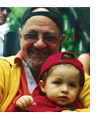

|
| GENERATIONS
excerpt from
Letters to Sam: A Grandfather's Lessons on
Love, Loss, and the Gifts of Life Compassion Works Both Ways by Dr. Daniel Gottlieb
Reprinted with permission of Sterling Publishing Co., Inc., from LETTERS TO SAM by Daniel Gottlieb. Copyright © 2006 by Daniel Gottlieb. Dear Sam, In my last letter, I told you how my different-ness draws out peopleís kindness. When I use an elevator, I need someone to push the buttons. When Iím at a restaurant, I need someone to take the wrapper off my straw. Whenever I drop something on the floor (which is pretty often), I need someone to pick it up. Research shows that doing a kindness for someone else boosts a personís endorphins, the bodyís natural antidepressants. Your differentness will make people want to help you, too; and helping you will help them feel good. But I think our vulnerability can open heartsóour own and othersíóeven more powerfully than that. An exchange based on genuine caring can affect people at the very deepest level. If that were not so, Iím not sure I would be alive today. In intensive care at Jefferson University Hospital, about two weeks after my accident, I truly did not know if I wanted to liveóor could liveóas a quadriplegic. Yes, I still had a marriage and two beautiful children. I might even have a career ahead of me. I was surrounded by people who loved me and told me I was still a worthwhile person. But even if I had a future, I thought I would prefer death to quadriplegia. When someone breaks his neck, the head must be completely immobilized so the bones can heal. In the old days, doctors would encase the patient in a plaster cast from head to waist, with just the face exposed. The patient looked like a mummy! Today, they use something called a halo vest. Believe me, the halo has nothing to do with angels. It is a metal hoop that surrounds the skull about an eighth of an inch above the scalp. The hoop is bolted into skull bone. (Twenty-five years later, I still have scars on my forehead where the bolts were fastened.) From the halo, stainless-steel rods come straight down, fixed to a fiberglass vest to keep the head from turning. In the intensive care unit, with my skull bolted in a fixed position, I could not move my head up, down, right, or left. I could only look up at the dimly lit ceiling and listen to the hums and beeps of medical equipment and monitors. IV fluids dripped steadily into my arm. A catheter, implanted in my bladder, drained off urine. The pain in my head was terrible. My only wish was to fall asleep and never wake up. After a while, I became aware that someone had taken a seat beside my bed. Though I couldnít see her clearly, I assumed it was a nurseóperhaps someone who had treated me earlier, or had just come on duty. A womanís soft voice asked if I was a psychologist. I said I was. She asked if she could talk to me about something that was on her mind. Of course, I said. It was night and the IC unit was hushed. In a voice scarcely above a whisper, she told me about someone she loved dearly who had left her. With the loss of this love came a sense of aloneness she felt she couldnít bear. Her pain was so intolerable that she was having thoughts of ending her life, and these thoughts frightened her. She couldnít have known I was having some of the same feelings. But because I understood her pain so deeply, I was able to listen with great compassion. How long did we talk? In my memory the hushed conversation was timeless. It could have been fifteen minutes; it could have been several hours. She told me about her life, her suffering, her loss, and the unbearable pain. She didnít care about my halo vest, my catheter, or my IVs. She didnít care whether I could walk or dance or make love. She didnít even seem to care about my suffering. She just wanted me to help her with her pain. But as I listened to her, for the first time since my accident, I didnít care about my suffering either. I only cared about hers. She never leaned over my bed, so I never got to see her face. In my mind, in my heart, she has become a magical, mystical voice that entered my life and touched my soul. That night, after we had talked, I was able to offer her a referral. As she left, I knew that I had been able to help her. And at that moment, I knew I could live as a quadriplegic. From that voice at my bedside I heard that I could still be of value in this world. Everyone else had been trying to convince me that I was still a worthwhile person, but the only way I could really learn that lesson was from someone who asked something of me. Quite possibly, that evening, she and I saved each otherís lives. Love, Pop  Dr. Dan Gottlieb last appeared in Empty Nest in the Fall/Holiday 2007 issue. Dr. Dan Gottlieb last appeared in Empty Nest in the Fall/Holiday 2007 issue.
|
© 2009 Spring Mount Communications